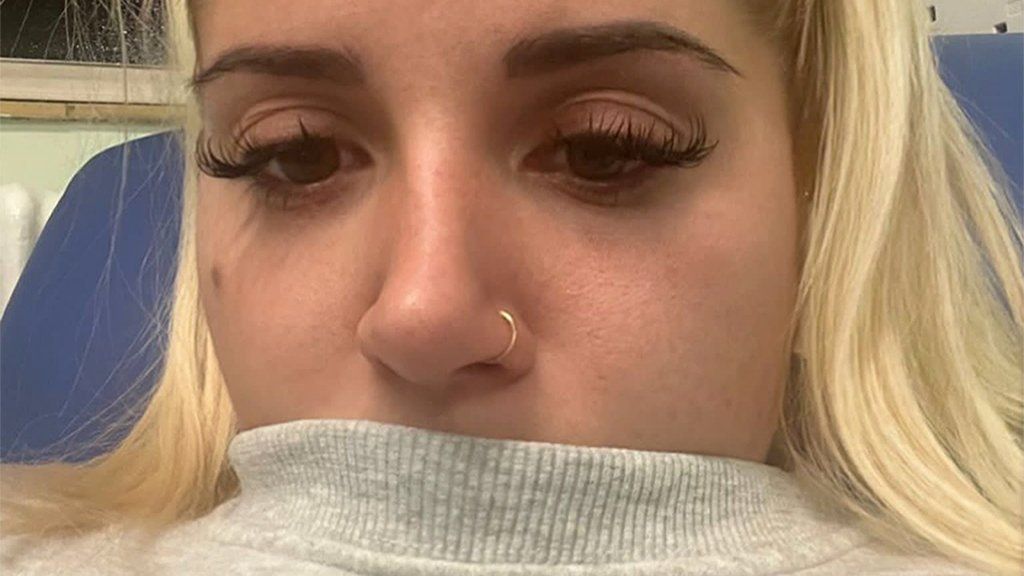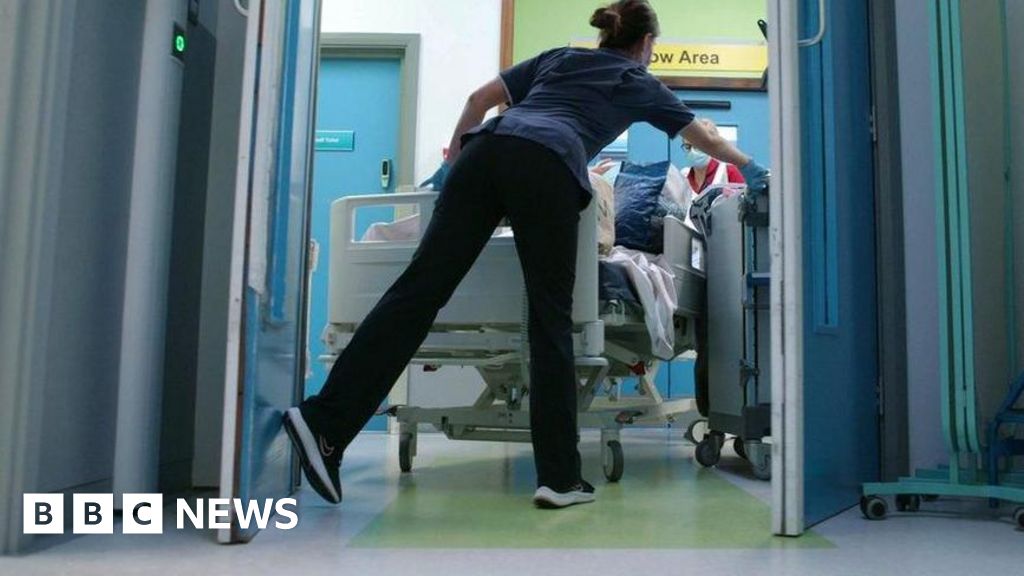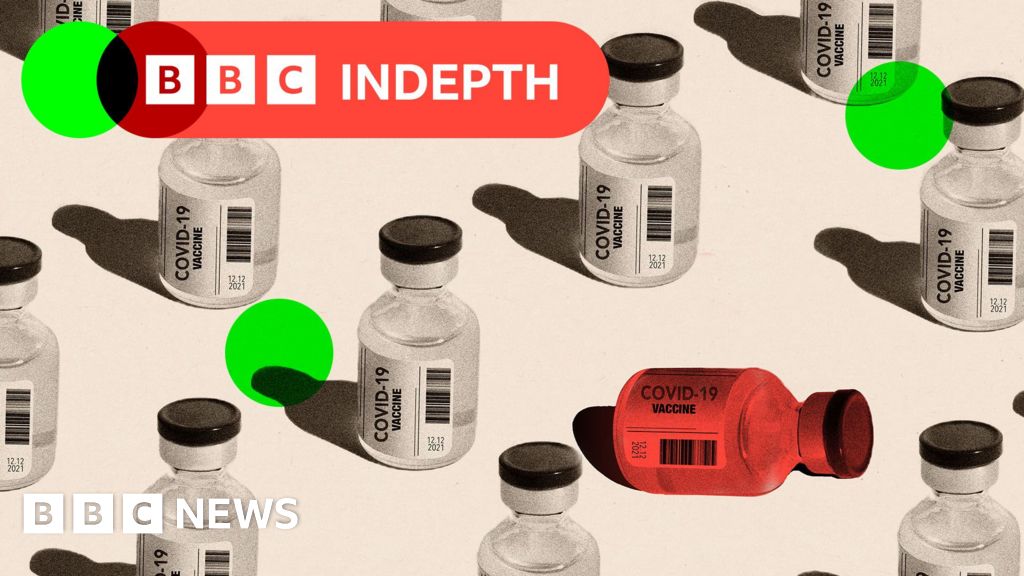ARTICLE AD BOX

Maddy threw up stomach acid, blood, white foam after taking an unapproved version of the drug
By Aoife Walsh and Pria Rai
BBC News and BBC Three
A woman who was illegally sold a weight loss drug on social media told the BBC she ended up in A&E vomiting blood.
Maddy, 32, fell seriously ill after using an unlicensed version of semaglutide - the active ingredient in Ozempic - from Instagram.
A BBC investigation found unregulated sellers offering semaglutide as a medicine, without prescription, online.
It also found the drug being offered in beauty salons in Manchester and Liverpool.
Doctors say drugs bought from unregulated sources are dangerous and could contain potentially toxic ingredients.
Demand for Ozempic, a prescribed type 2 diabetes medication, spiralled last year after it hit the headlines for being Hollywood's secret weight loss drug - nicknamed the skinny jab.
The drug works by lowering blood-sugar levels and slowing down food leaving the stomach.
Its soaring popularity led to a rise in off-label prescriptions for weight loss, which triggered global supply issues and created a shortage for diabetes patients in the UK.
As pharmacies across the UK struggled to get hold of the medication, an illicit black market selling semaglutide "diet kits" began to flourish online.
Maddy was sent two vials and some needles by post
Delivered by post, these usually contain needles and two vials - one containing a white powder and the other a liquid - which have to be mixed together before the drug can be injected.
That's what came through Maddy's letterbox after she searched for a "quick fix" on Instagram to help her lose weight ahead of an event.
"I struggle in general with losing weight. I'm just not one of those people that can shift it easily," she says.
Maddy came across The Lip King, a company run by Jordan Parke. The Lip King's Instagram feed was flooded with before-and-after transformation photos of women with newly slimmed physiques and screenshots of text messages from customers raving about his product. Maddy wanted in.
After a brief message exchange with Mr Parke and a £200 bank transfer, Maddy was sold 10mg of semaglutide with no questions asked.
An Instagram conversation between Maddy and the Lip King
She also received a video from him on WhatsApp instructing her how to mix and inject the drug, along with dangerous guidance advising her to take a higher dose than what health officials would recommend.
After her first injection, Maddy was instantly "extremely ill, bed-bound, vomiting".
She says Mr Parke told her over text that vomiting was normal and to take anti-sickness tablets.
WhatsApp messages sent between Maddy and the Lip King
A few weeks later, when the nausea had passed, Maddy tried the drug again - this time before bed.
"I was woken up by the vomiting," Maddy says.
"It was bad. I was throwing up all night, to the point where I was throwing up stomach acid, blood, white foam."
She went to A&E the following afternoon, where she was put on a drip.
"I can be a bit of a drama queen, but I thought I was dying. I was literally crunched over, bawling my eyes out to my mum. I was so angry, as well, because I was like, no-one told me that this was going to be a side effect," she says.
Watch: Unlicensed weight loss jab sold on social media
"I did my own research, but I didn't see anywhere that anyone was suffering to this level."
The BBC made several attempts to contact Mr Parke, but he did not respond.
Removing websites
Mr Parke is one of many illicit sellers peddling semaglutide through social media. To find out what is actually in the drugs, the BBC bought unlicensed semaglutide from several sellers and had them tested in the lab.
The results showed inconsistencies in what was in each sample. Although most of the products contained semaglutide, vials from two different sellers had no semaglutide in them at all, and nearly all of them, including the one bought from the Lip King, did not contain the full dose that had been paid for.
Ozempic is available on the NHS strictly for type 2 diabetes patients. Wegovy, another semaglutide drug prescribed specifically to treat obesity, will be offered on the NHS to those with a body mass index (BMI) of at least 35, and exceptionally, some people with a BMI of 30 and a weight-related health problem.
Under UK law, it is illegal to sell semaglutide as a medicine without a prescription.
Drugs manufacturer Novo Nordisk is the only company approved to sell and market semaglutide, branded as Ozempic and Wegovy, in the UK, but it is now battling against knock-off online sales.
Maddy tells her experience to BBC health reporter Aoife Walsh
The firm says it is working with a third party to "proactively identify and remove websites, ads or social-media accounts selling counterfeit semaglutide", and has been carrying out "in-depth investigations into copyright infringement, criminal networks and sellers illegally diverting our products".
But the BBC has discovered sellers that are closed down one day usually return the next under a new name.
Online sellers attempt to get around the law by placing "not fit for human consumption" or "for research purposes only" on their product.
Gerard Hanratty, a public law expert, says: "You can put lots of different things on a label. It doesn't mean to say that it is then legal and you are compliant with the regulations."
He says sellers would need to be able to prove they are supplying the product for research purposes and not for human use in order for the warnings to be valid.
Salon sales
A BBC Three documentary The Skinny Jab Uncovered found the unapproved versions of the drug advertised in beauty salons on British high streets. Undercover investigators visited four salons in Manchester and Liverpool and received dangerous advice about mixing and dosages in some about how to use the drug.
In one salon, a reporter was told: "Well, if you have too much, you just wouldn't want to eat anything, and you might feel sick. It's not going to be dangerous."
The Medicines and Healthcare products Regulatory Agency (MHRA) says it has received reports of people ending up in hospital after using fake Ozempic pens, which are also flooding the market, with more than 300 seized since January.
Prof Barbara McGowan, a consultant endocrinologist who co-authored a Novo Nordisk-funded study which trialled semaglutide to treat obesity, says licensed medications - like Ozempic and Wegovy - go through "very strict" quality controls before they are approved for use.
She warns that buyers using semaglutide sourced outside the legal supply chain "could be injecting anything".
"We don't know what the excipients are - that is the other ingredients, which come with the medication, which could be potentially toxic and harmful, [or] cause an anaphylactic reaction, allergies and I guess at worse, significant health problems and perhaps even death," she says.
Prof McGowan says that drugs like semaglutide can cause "significant side effects", such as nausea, for some patients, which is why proper medical support is needed.
"The important thing to understand is not just about the prescription. It's about... all the wraparound care that one gets from senior health-care professionals," she adds.
'Huge health risks'
Dale Dennis, a personal trainer from East Yorkshire, sells 10mg vials of the unofficial drug and pre-mixed pens.
Mr Dennis sells the unlicensed drug on social media, encouraging buyers to message him on WhatsApp to place an order.
His company, Raw Peptides Limited, is listed as a business involved in the sale of "new cars and light motor vehicles".
The BBC contacted Mr Dennis for comment, but after initially agreeing to speak to us, he cancelled our call and sent a text using an expletive, adding: "I definitely make your yearly salary weekly".
Dr Simon Cork, senior lecturer in physiology at Anglia Ruskin University, stresses that semaglutide is not a short-term weight loss solution and is suitable only for people with obesity.
"That might be seen as being kind of selfish, because those people quite understandably want to lose some weight, but the drug is not tested or designed to help people in that position."
He says mixing and injecting weight loss drugs at home comes with "huge risks".
"The vast majority of the population are not qualified or trained to administer injectable drugs themselves. And the drugs you buy if you're prescribed Wegovy or Ozempic, or one of the licensed drugs, those come in predefined amounts," he says.
"So you press a button and you get the correct dose of the medication. You're not drawing up an amount into a needle that you're then injecting into yourself."
The vials of semaglutide sold illegally online do not have the safeguards the official medication comes with to prevent patients from overdosing.
Tilly, 22, decided to stop using semaglutide she bought on TikTok after she accidentally injected double the amount she was supposed to.
"When it came, it didn't have any instructions, which completely confused me… I messaged the company after being like 'what am I meant to do with this?' And she was like, 'well, join a Facebook group'," she says.
"It felt like the worst hangover ever. I felt like I had a really bad headache. I felt sick, and I felt stressed about the fact that I'd taken too much," she says.
The medicines regulator says it will use its powers to protect the public by taking "appropriate enforcement action, including, where necessary, prosecuting those who put your health at risk".
The Medicines and Healthcare products Regulatory Agency's chief safety officer, Dr Alison Cave, warns that buying semaglutide from illegal suppliers "means there are no safeguards to ensure products meet our quality and safety standards, and taking such medicines may put your health at risk".
BBC Three investigates the black market in cut price 'skinny jabs' and asks: are they what they claim to be? And are they safe?

 1 year ago
29
1 year ago
29








 English (US) ·
English (US) ·